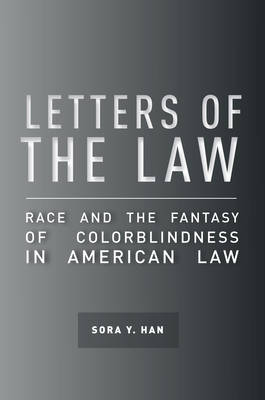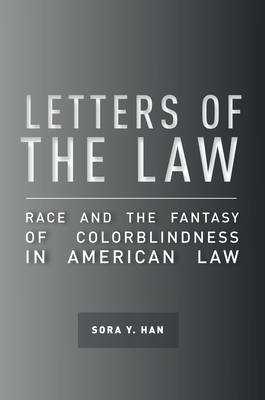
- Retrait gratuit dans votre magasin Club
- 7.000.000 titres dans notre catalogue
- Payer en toute sécurité
- Toujours un magasin près de chez vous
- Retrait gratuit dans votre magasin Club
- 7.000.0000 titres dans notre catalogue
- Payer en toute sécurité
- Toujours un magasin près de chez vous
Description
One of the hallmark features of the post-civil rights United States is the reign of colorblindness over national conversations about race and law. But how, precisely, should we understand this notion of colorblindness in the face of enduring racial hierarchy in American society? In Letters of the Law, Sora Y. Han argues that colorblindness is a foundational fantasy of law that not only informs individual and collective ideas of race, but also structures the imaginative capacities of American legal interpretation. Han develops a critique of colorblindness by deconstructing the law's central doctrines on due process, citizenship, equality, punishment and individual liberty, in order to expose how racial slavery and the ongoing struggle for abolition continue to haunt the law's reliance on the fantasy of colorblindness.
Letters of the Law provides highly original readings of iconic Supreme Court cases on racial inequality--spanning Japanese internment to affirmative action, policing to prisoner rights, Jim Crow segregation to sexual freedom. Han's analysis provides readers with new perspectives on many urgent social issues of our time, including mass incarceration, educational segregation, state intrusions on privacy, and neoliberal investments in citizenship. But more importantly, Han compels readers to reconsider how the diverse legacies of civil rights reform archived in American law might be rewritten as a heterogeneous practice of black freedom struggle.
Spécifications
Parties prenantes
- Auteur(s) :
- Editeur:
Contenu
- Nombre de pages :
- 184
- Langue:
- Anglais
- Collection :
Caractéristiques
- EAN:
- 9780804789110
- Date de parution :
- 19-05-15
- Format:
- Livre relié
- Format numérique:
- Genaaid
- Dimensions :
- 152 mm x 229 mm
- Poids :
- 385 g

Les avis
Nous publions uniquement les avis qui respectent les conditions requises. Consultez nos conditions pour les avis.






